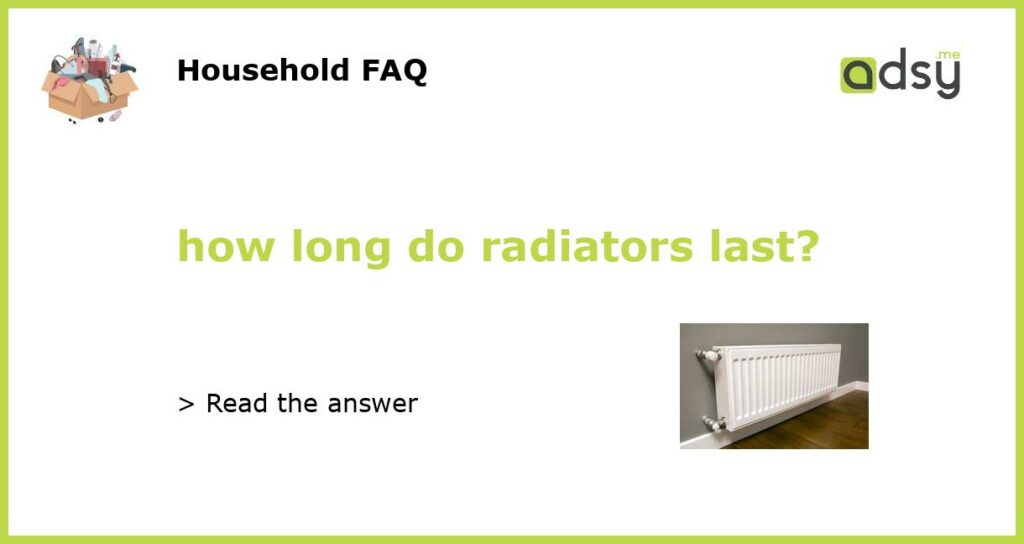How Long Do Radiators Last?
Radiators are an essential part of any heating system, providing warmth and comfort during the colder months. However, like any household appliance, radiators have a limited lifespan. Many homeowners may wonder, “how long do radiators last?” In this article, we will explore the average lifespan of radiators and factors that can affect their longevity.
Average Lifespan of Radiators
The average lifespan of radiators typically ranges from 15 to 20 years. This estimation is based on the quality of the radiator, how well it is maintained, and its usage. High-quality radiators that are properly maintained can last longer, while lower-quality radiators may have a shorter lifespan.
Factors Affecting Radiator Lifespan
Various factors can affect the lifespan of radiators:
A. Material and Quality
Radiators are commonly made from materials such as cast iron, steel, aluminum, or a combination of these. Cast iron radiators are known for their durability and can last for decades. Steel radiators, on the other hand, may have a shorter lifespan if not properly maintained. Aluminum radiators are lightweight and resistant to corrosion, but they may not be as durable as cast iron radiators.
B. Maintenance
Regular maintenance is crucial to prolonging the lifespan of radiators. This includes bleeding the radiators to remove air pockets, checking for leaks or corrosion, and cleaning any dust or debris that can affect their performance. Proper maintenance can prevent issues that may lead to the early deterioration of radiators.
C. Usage and Heat Output
The frequency and intensity of usage can impact how long radiators last. If a radiator is consistently used at high temperatures, it may experience more wear and tear, leading to a shorter lifespan. Additionally, radiators that are frequently turned on and off may have a shorter lifespan compared to those that are consistently used.
D. Water Quality
The quality of the water in the heating system can also affect the lifespan of radiators. Hard water, which contains minerals such as calcium and magnesium, can cause limescale buildup and corrosion in the radiator. This can lead to reduced heat output and potential damage to the radiator over time. Using water treatment solutions or installing a water softener can help minimize these issues.
E. Installation and Placement
The proper installation and placement of radiators can also impact their lifespan. If radiators are installed incorrectly or not properly balanced, it can affect their overall performance and lead to issues such as uneven heat distribution or increased strain on the radiator. Additionally, radiators placed near sources of moisture or in areas prone to condensation may be more susceptible to corrosion.
Signs of a Failing Radiator
While radiators may have a general lifespan, certain signs can indicate that a radiator is nearing the end of its useful life. These signs include:
A. Uneven Heating
If certain areas of a radiator feel significantly cooler than others, it may be a sign of internal blockages or corrosion. This can hinder the radiator’s ability to heat a room effectively.
B. Leaks or Corrosion
Visible leaks or signs of corrosion, such as rust or discoloration, are indicators that a radiator may be deteriorating. These issues can affect the performance and lifespan of the radiator.
C. Noisy Operation
If a radiator starts making unusual noises, such as gurgling or banging sounds, it may be a sign of trapped air or debris within the radiator. This can affect its efficiency and longevity.
D. Cold Spots on Radiator Surface
If certain areas of a radiator feel cold to the touch while others are hot, it may indicate a buildup of debris or sludge within the radiator. This can affect its ability to emit heat properly.
Extending the Lifespan of Radiators
There are steps homeowners can take to extend the lifespan of their radiators:
A. Regular Maintenance
Performing regular maintenance, such as bleeding the radiators, checking for leaks, and cleaning dust and debris, can help prevent issues and prolong the lifespan of radiators.
B. Water Treatment
Using water treatment solutions or installing a water softener can help prevent limescale buildup and corrosion in radiators, thus extending their lifespan.
C. Professional Inspection
Having radiators professionally inspected periodically can help identify any underlying issues or potential problems. Prompt repairs or necessary adjustments can help extend the lifespan of radiators.
D. Proper Placement and Installation
Ensuring radiators are properly installed, balanced, and placed away from sources of moisture can help minimize issues and prolong their lifespan.
When to Replace Radiators
If a radiator is showing signs of significant wear and tear, such as leaks, corrosion, or consistent heating issues, it may be time to consider replacing it. Older radiators may be less efficient and costlier to maintain. Consulting a professional plumber or heating specialist can help determine if replacing the radiator is the best course of action.
In conclusion, the average lifespan of radiators is 15 to 20 years. Factors such as material quality, maintenance, usage, water quality, and installation can affect how long radiators last. Signs of a failing radiator include uneven heating, leaks, corrosion, and unusual noises. Homeowners can extend the lifespan of their radiators through regular maintenance, water treatment, professional inspection, and proper placement. When radiators show significant wear and tear or persistent issues, it may be time to consider replacement.






